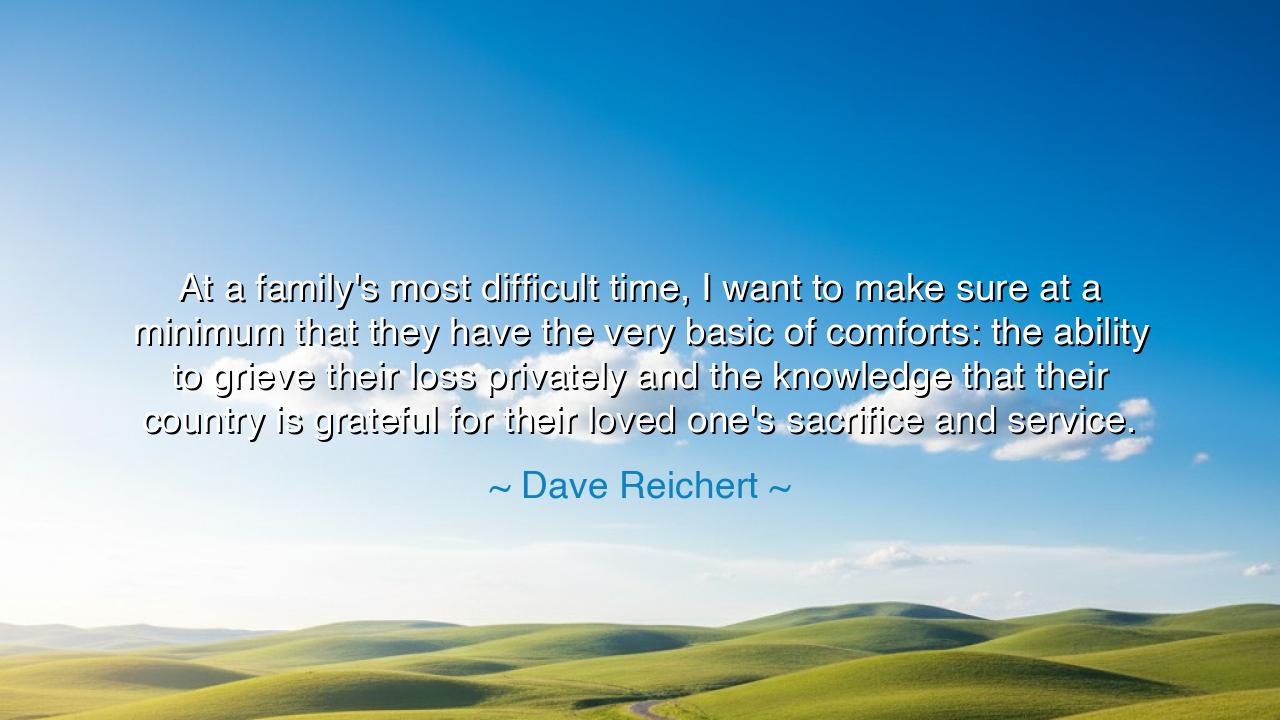
At a family's most difficult time, I want to make sure at a
At a family's most difficult time, I want to make sure at a minimum that they have the very basic of comforts: the ability to grieve their loss privately and the knowledge that their country is grateful for their loved one's sacrifice and service.






Hear the solemn words of Dave Reichert, spoken with compassion for the weary and reverence for the fallen: “At a family’s most difficult time, I want to make sure at a minimum that they have the very basic of comforts: the ability to grieve their loss privately and the knowledge that their country is grateful for their loved one’s sacrifice and service.” In this saying lies the timeless bond between the living and the dead, between the one who gives life for their nation and those who remain to bear the sorrow of their absence.
The meaning is clear and profound. When the drums of war fall silent and the body is laid in its final rest, the true cost of conflict is borne not only by the soldier but by the family left behind. In that hour of deepest pain, words are fragile, but the gestures of a grateful country can soothe like balm. Reichert reminds us that to allow the bereaved to grieve in peace, shielded from intrusion, and to assure them that their sacrifice is not forgotten, is the sacred duty of all who benefit from such service.
The ancients themselves honored this principle. In Athens, those who fell in battle were buried with ceremony, and the people as one gave thanks for their service. Pericles, in his famous funeral oration, reminded the citizens that the dead had purchased freedom with their blood, and that their families must be upheld by the gratitude of the state. Rome too, though stern and unyielding, held public rites for its fallen, so that no widow or orphan might believe their loss was suffered in vain. In every great civilization, the act of remembrance has been both duty and comfort.
Consider also the more recent story of the Unknown Soldier. Entombed in Arlington, he is not one man but all men who fell unnamed. Families with no grave to visit find in that tomb a place of mourning, and in the eternal guard of sentinels, a symbol that the country has not forgotten. It is this very spirit that Reichert invokes: that in moments of immeasurable sorrow, when no words suffice, the assurance of honor and gratitude can become a pillar for the grieving.
Yet we must not see this as the duty of governments alone. It is also the duty of each citizen. To write a letter, to stand in silence at a memorial, to offer kindness to a family that mourns—these are acts by which we, too, provide the basic comforts. For grief, though carried in private, is eased when others acknowledge its burden. When a nation’s people together whisper “thank you” to those who have given all, the bereaved find they do not stand alone.
The lesson here is radiant: never forget the sacrifice that sustains the peace you live in. If you encounter a family in mourning, do not look away, but honor their sorrow with silence, with respect, with gratitude. If you speak, let your words affirm their loved one’s service. And if you act, let it be in kindness that acknowledges their pain. In this way, the burden of grief is shared, and remembrance becomes not just a duty, but an act of love.
Therefore, O seeker of truth, let Reichert’s words be written upon your heart. In the most difficult times of others, do not strive to solve their sorrow, but to provide comfort, privacy, and gratitude. For though loss can never be undone, it can be dignified, and though pain cannot be erased, it can be softened by honor.
So remember: to grieve is the right of every family, to honor is the duty of every nation, and to show gratitude is the privilege of every soul who benefits from the service of another. In fulfilling this sacred cycle, we preserve not only memory, but also the noblest part of what it means to be human.






AAdministratorAdministrator
Welcome, honored guests. Please leave a comment, we will respond soon